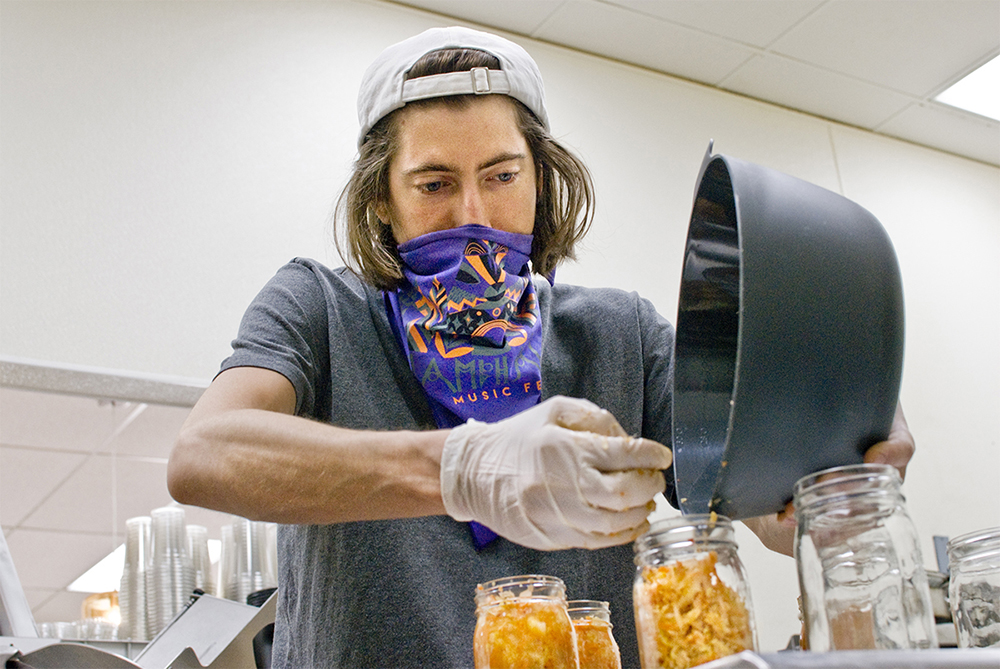
Joe Zich bottles a batch of his 309 Cultures kimchi in the kitchen at Sunrise Health Foods in Metro Centre, 4700 N. University St. The store sells about 130 jars a month and several other central Illinois stores also sell 309 Cultures. (PHOTO BY CLARE HOWARD)
Joe Zich wants to feed your gut. Fermented foods are his passion.
He has parlayed his personal passion into a small, part-time business called 309 Cultures that includes a line of kimchi and sauerkraut.
Zich, 28, said when he started eating fermented food daily, he almost immediately started feeling better.
The science behind probiotic fermented food and a healthy gut is now more widely understood than it once was.
“It’s too important to ignore. Too convincing to refute,” Zich said. “I started fermenting from a culinary versus a scientific perspective. That was about six years ago. Then I started reading more about the science. Now I read books on the gut microbiome.”
Zich reached out to Naturally Yours grocery store, now Sunrise Health Foods, several years ago. Store manager at the time, Matt Kowal, helped him get started.
Zich has all his licenses with the Peoria City/County Health Department. He prepares and bottles his kimchi in the commercial kitchen at Sunrise Health Foods.
His bottles are glass, and he uses only organic ingredients and Himalayan salt. His labels are designed by Bradley University graduate Chelsie Tamms who has her own design firm Lettering Works.
Kowal said, “I never ate sauerkraut in my whole life. I tasted his, and now I eat it everyday.”
Zich bottles in small quantities and makes about 130 16-ounce jars a month. He’s deliberately trying to keep his growth slow and sells at Sunrise Health Foods and Sous Chef in Peoria, Green Top in Bloomington and Cornucopia in Galesburg. Owners of Sunrise Health Foods would like to start selling his kimchi in their Chicago area stores.
At Sous Chef, Zich offers $2 off for anyone using Food Stamps. Store owners Raphael and Katie Rodolfi are doubling the value of Food Stamps used in their store on fresh fruits and vegetables.
“A probiotic like kimchi feeds the gut microbiome. Now I have more energy,” Zich said. “No kid comes out of the womb craving junk food. A balanced microbiome helps children crave good food rather than junk food.”
Anthony Wood is a fan of kimchi. He enjoys eating it at Zion Coffee with a hard cooked egg.
“It gives you a charge for the day,” he said.
Zich writes a blog “Easy Going Plant Based.”
Dr. Amy Christison has eaten kimchi all her life, first growing up in a Korean family in Los Angeles and now as a physician and assistant director of the pediatrics residency program at University of Illinois College of Medicine at Peoria.
“The more diverse the gut microbiome is the better,” she said. “Different microbial members play different roles in the work force. A diverse work force gets more work done.”
She calls some of this work the house cleaning that goes on in the human body. She said the science behind the gut microbiome is complicated and still evolving. Diversity of the gut microbiome appears to be linked to immune health and reduction of inflammation. Research is ongoing linking it to cardiac health, diabetes and even weight gain.
She cautions that people with a serious immune deficiency should speak with their physicians before starting to eat kimchi.
The microbial germs in the gut have a symbiotic relationship with the functions of a healthy human body. Christison said there are many kinds of kimchi and great diversity in the house keeping chores they each perform.
Many Western communities have a narrow culinary palate, but as children are exposed to more people from around the globe who come with diverse food cultures, children broaden their taste enjoyment.
Dr. David Kirk, a chiropractor at the Washington Wellness Center, said his whole family loves 309 Cultures. He has 5-year-old twins and a 2-year old, and they eat kimchi.
“There is 20 years of research behind gut health and probiotics,” he said. “Fermented foods supply trillions more colony-forming units than a bottle of supplements.”
He recommends fermented foods to anyone who can tolerate them.
“In college, I never heard of kimchi. Now probiotics are mainstream. When doctors recommend a round of antibiotics, they often recommend probiotics. In functional medicine, the starting point is the gut health,” he said.
There are many different levels of spiciness in different kinds of kimchi, some are pasteurized and some unpasteurized. Kirk likes 309 Cultures in part because it is unpasteurized and many beneficial bacteria are still present. Christison added there are still some benefits that can be derived from pasteurized kimchi.

Recent Comments